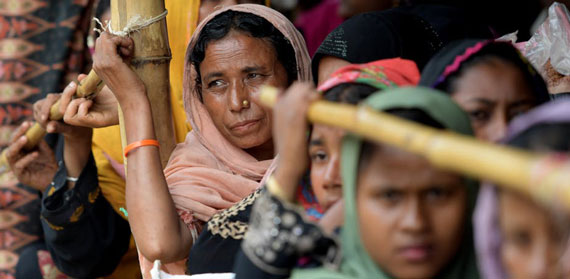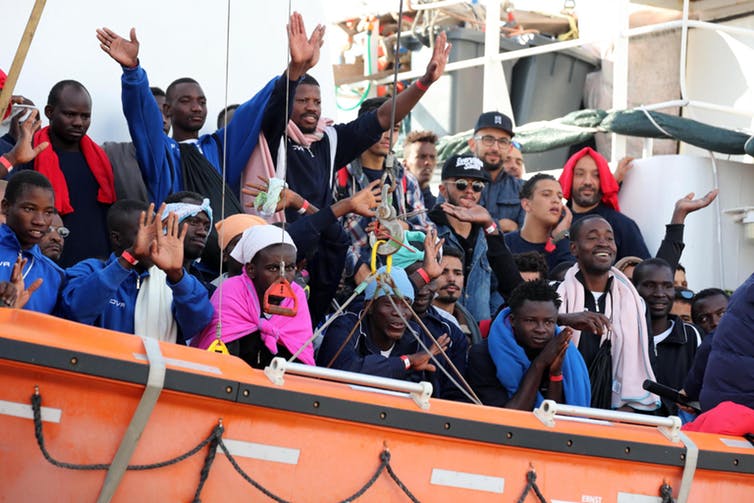Rohingya refugees in mid-December at a camp in Bangladesh. EPA-EFE/Tracey Nearmy Australi and New Zealand Out.
Guest post by Professor Heaven Crawley and Katherine Jones, Centre for Trust, Peace and Social Relations
The world has a chance to strike a bold agreement in 2018 that could improve the lives of refugees and migrants, but only if world leaders put aside the politics that often plagues debate on these issues and focus on people’s fundamental rights.
It’s been more than a year since leaders came together in September 2016 at the UN to try and bolster international cooperation on migration and refugee issues. The resulting New York Declaration for Refugees and Migrants set in motion global consultations to develop two parallel agreements, known as global compacts – one on refugees, and one on migration. The goal was to develop a comprehensive approach to international migration which protects the human rights of all refugees and migrants and increases cooperation between countries, in turn reducing the political heat which has come to dominate current responses to migration.
In mid-December, representatives from states, international organisations and civil society groups gathered in Geneva to review progress on the global compact for refugees. This came hot on the heels of a similar meeting in Mexico to take stock of progress on the migration agreement and a decision by Donald Trump to withdraw the US from the global compact process.
Whether it will be possible for political leaders to find a new way forward over the coming months remains unclear. But our new book argues that a new framework is urgently needed to respond to the dynamics of international migration. We also highlight the ways political leaders use sometimes arbitrary distinctions between the categories of “refugee” and “migrant” to control – and even prevent – migration.
The problem of categories
The decision to have two global compacts rather than one was both practical and political. Increases in the number of people moving countries for work and the integration of the International Organization for Migration into the UN system in 2016 pushed migration onto the UN’s mandate for the first time. Yet, the specific rights of refugees and states’ obligations to protect them enshrined in the Refugee Conventionmeans that subsuming refugees within the broader category of “migrants” is legally and institutionally unpalatable. And so the UN continues to treat the needs of “refugees” and “migrants” as separate and distinct.
For those on the move, however, life is more complicated – an issue we’ve highlighted in our research which draws on first-hand accounts from 500 refugees and other migrants who arrived on the shores of Europe in 2015.
In practice, the lines between who is a refugee and who is a migrant are often blurred. People often move between different categories as they travel to different places looking for security and rights for themselves and their families. This is more likely the longer and more protracted the journey becomes.
People often move for a combination of political and economic reasons. Many of those we spoke to had left their countries due to persecution and violence. But others explained that conflict in countries such as Syria, Afghanistan, Iraq and Yemen had undermined their ability to earn a livelihood by killing primary breadwinners, destroying businesses and rendering it impossible to travel to work. After initially moving to countries such as Lebanon, Jordan and Turkey, many were unable to find work or access housing, education and healthcare for themselves and their children and decided to move on. These people are simultaneously “refugees” and “migrants”.
Safe in Italy: rescued migrants arriving in October 2017. Igor Petyx/EPA
Meanwhile, those treated as “migrants” – while not recognised as “refugees” – have also often had their human rights violated. Many of those crossing the Mediterranean to Italy had initially travelled to Libya for work but found themselves subject to well-documented human rights abuses including kidnapping and forced labour. While recent video footage of slave auctions triggered a wave of condemnation, most of those people from West and Central Africa have been routinely dismissed as “migrants” with no protection needs, even though the situation in Libya has been known about for years.
Human rights are paramount
The problem with categories such as “refugee” and “migrant” is that they have been used to limit and contain migration flows to Europe. This has been achieved by creating a two-tier system of protection and assistance in which the rights and needs of those not qualifying as “refugees” under the legal definition have effectively been disregarded. It’s troubling that the two global compacts reinforce the arbitrary distinction between “refugees” and “migrants”. So too is the focus on “migration management” rather than rights.
All refugees and migrants, regardless of their journey or how they enter a country, have rights under existing international human rights law. The New York Declaration reaffirmed that countries will protect the human rights of all refugees and migrants, including those who enter irregularly. But since then, discussions have focused on how to “manage” migration, stop irregular migration, and combat smuggling rather than on how to ensure that these rights are delivered and protected.
Failure to protect the rights of all refugees and migrants can exacerbate the very problems that the global compacts seek to address. Smuggling is a clear example. One in ten people who fled countries such as Syria, Afghanistan and Iran to Europe who we interviewed in Turkey and Greece had tried but failed to travel regularly. They had either applied for a visa for a country regarded as safe (usually in Europe or North America), a UN resettlement programme or family reunification. Many more – especially Syrians – had considered applying for a visa in advance but were unable to do so. Smugglers were therefore a necessity, not a choice.
As countries move forward into the negotiating phase of the global compacts without the US, they must keep human rights front and centre of the discussions. Undermining or limiting the rights of refugees and migrants ultimately reduces the protection available to all of us, as human beings.
The global compacts, which will be agreed by September 2018, do have the potential to make a difference. Even when non-binding, such agreements can play an important role in setting out common principles, commitments and understandings about the existing rules of the game. But if they are to deliver on their promises, those involved in taking forward the global compacts will need to ensure that rights trump politics.
Originally written for ‘the Conversation’.





Comments are disabled